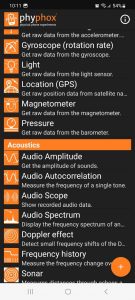As the winter 2022-2023 term is coming to an end, it gives me an opportunity to think about how we have been using smartphones in my physics classrooms in the last few years. While the original goal was to engage students, especially when we had to teach fully online, as our experience grew, we were able to uncover much deeper advantages of using this ubiquitous technology while helping students learn physics in or outside of our classrooms. Now it is not only about the engagement, it is about a very different way of learning physics and experiencing science in general. I also have to acknowledge how lucky I am to be able to collaborate with many of my colleagues and friends in this endeavour. So this has been a joint effort with my physics colleagues, including my husband, Prof. Valery Milner, who pioneered the use of smartphones in the UBC Physics Olympics, many amazing physics teachers, who have provided feedback and great ideas, as well as my physics teacher-candidates, who have been using smartphones in their physics methods course for the last three years and who have been mentoring secondary students who have participated in physics projects that used smartphones as scientific tools in very creative ways.
So, we have been using smartphones in three different ways:
a) As a powerful data collection tools – using Phyphox as the main source of data collection (see below). We also used Physics Toolbox, etc.
b) As a powerful data collection tool using its video features – the students recorded videos of different scientific experiments and then analyzed them using Video Analysis tools, such as Vernier Logger Pro Video Analysis or Tracker video analysis. This was especially helpful while learning about kinematics, collisions, etc.
c) As a tool for doing science simulations and visualizations using tools, such as PhET, etc.
From my own experience, smartphones opened unique opportunities to do science and to experience the excitement of figuring things out be it in a physics classrooms, or outside of it. However, they also required a lot of learning from our side. Smartphones helped us facilitate a meaningful intellectual engagement that reflects how science is done. For example, this term, our secondary students have conducted projects using a Phyphox app to explore the physics of music. The students produced sounds using various musical instruments and then used various acoustic components of Phyphox to analyze them. The students also investigated how sound can be generated and absorbed. Some of the secondary students delved into Fourier Analysis, they experienced the meaning of tones, overtones, basic frequency, etc. They investigated how different sounds are produced and how we represent the sound mathematically and graphically. The students also learned to do error analysis and realized how important it is to ask science questions that can be answered. While they were working on these projects, our future physics teachers were mentoring them and also learned a great deal about doing science as teachers.
In the different area, we are working on preparing for the next UBC Physics Olympics and considering how smartphones can be used for Pre-Builts (the setups our students prepare at home). This was something that allowed all students in British Columbia, independently of the availability of equipment in their physics labs at their schools to participate.

In summary, I see lots of opportunities in using Smartphones in physics education. I hope their use will grow and the next generation of physics teachers will be able to take full advantage of this ubiquitous technology.
To read more about it, please visit:

